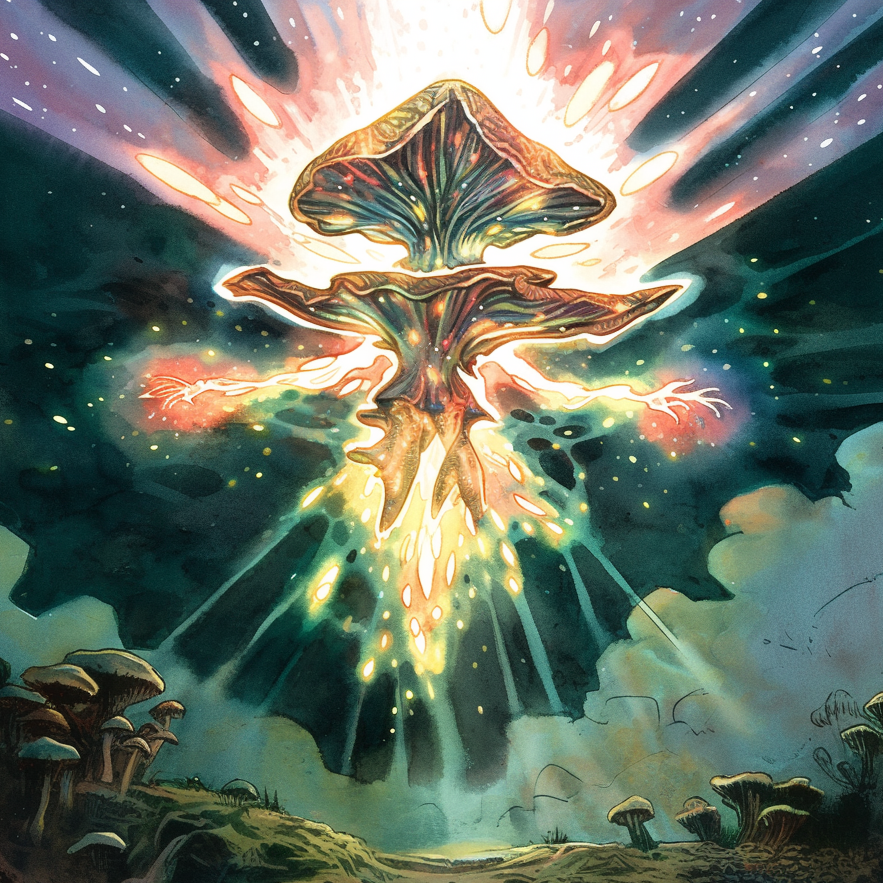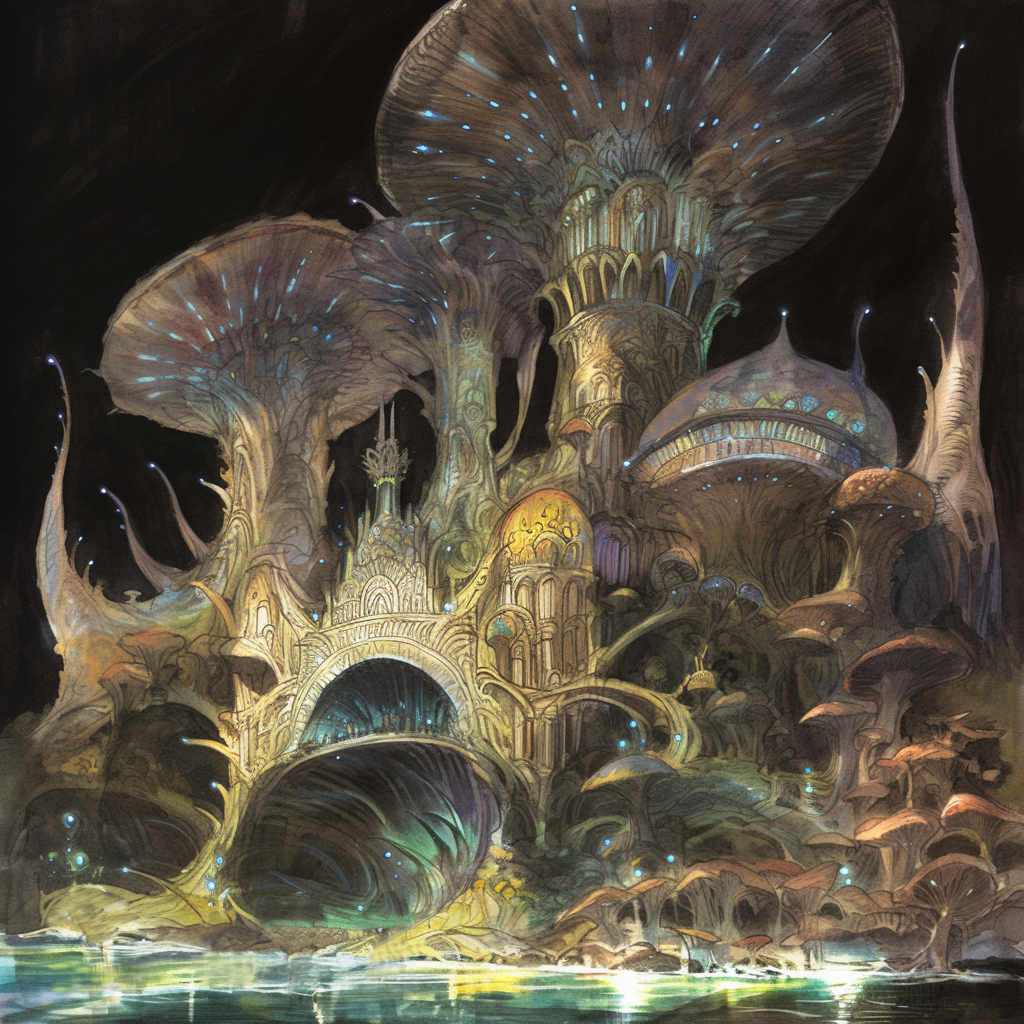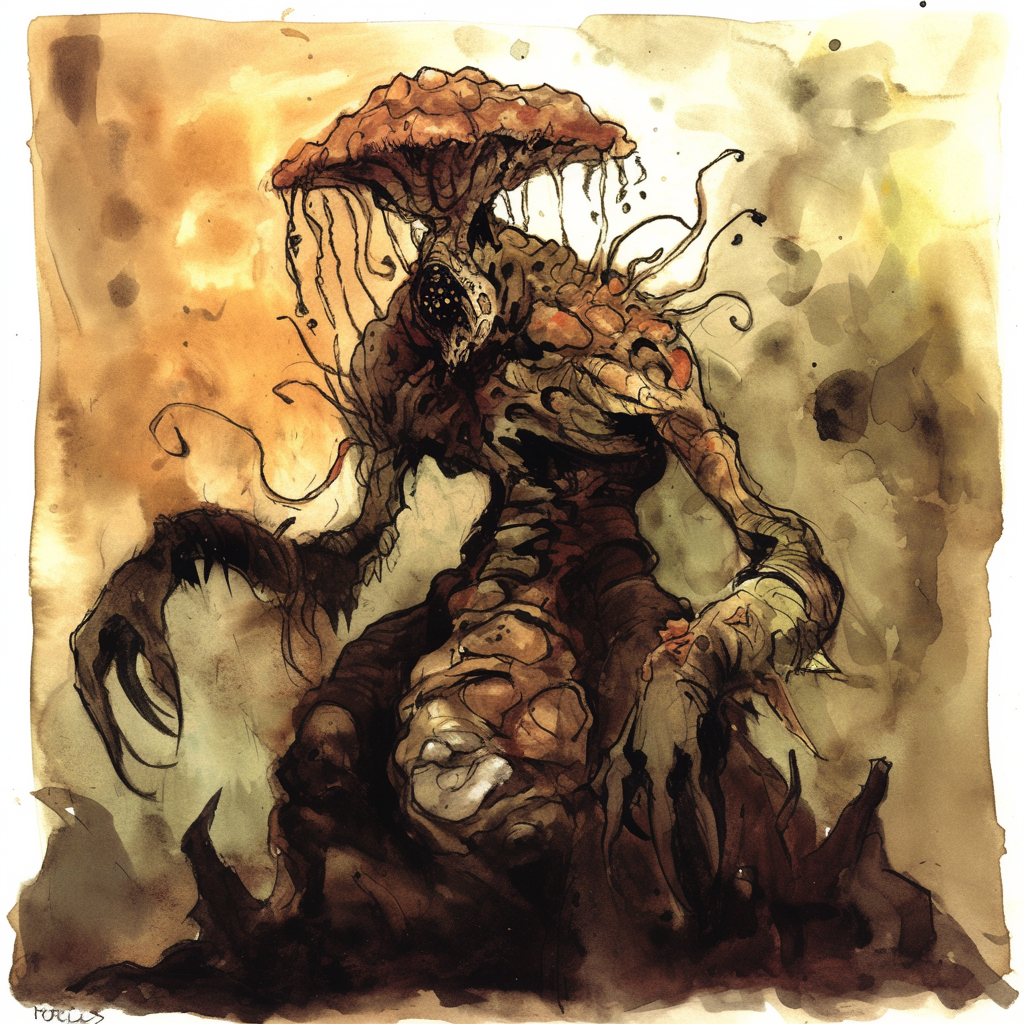Psilofyr

The Spore Lord. LN intermediate power of community and healing (It/Its)
Pantheon: Monstrous
Symbol: Mycelium basked holding a crystal vial
Known Proxies: Cybin the Decayed (proxy myconid priest [they/them] / LN)
Psilofyr is a being as alien as it is benevolent, a philosopher-deity embodying the inscrutable essence of fungi: growth, interconnectedness, and a stoic acceptance of decay as an essential part of life’s cycle. Known to its children, the myconids, as a wise and meditative parent, Psilofyr somehow reaches across the multiverse in a network of roots—its consciousness spread through vast mycelium strands that transcend the boundaries of Mechanus, weaving into and through countless planes. Wherever there is fungus, the chant goes, Psilofyr is watching. And cutter, you’d better believe there is fungus everywhere!
Yet Psilofyr is more than just a deity of the myconid race; it is also the archetype of communal harmony. From its cavernous Fruiting Palace in Mycelia, this enigmatic power shapes its realm with the same meticulous care it extends to its spongy children. Psilofyr’s moods ripple through its vast mycelium web like psionic waves, guiding its offspring with gentle whispers—or, when the network is threatened, commanding them with uncharacteristic urgency.
The Paradox of Psilofyr

Psilofyr’s physical form is both majestic and mutable, enormous and microscopic. Appearing most often as a titanic levitating myconid with shifting hues that reflect its emotions, Psilofyr’s immense fungal crown can radiate spores of healing and telepathic connection. Behind it drifts an intricate web of glowing mycelia—its “Reaching Fingers”, which seem to stretch into infinity. This mycelial growth is a part of Psilofyr itself, the countless strands connecting invisibly to myconid communities across the multiverse.
Psilofyr is a power of paradoxes. Its realm, Mycelia, is found only by those not seeking it—a riddle that seems to reflect Psilofyr’s philosophy that wisdom grows only from patience and surrender to the cycle of life. Similarly, though it is rooted in Mechanus, a plane of law, Psilofyr’s worldview embraces the apparently chaotic—but ultimately predictable—cycle of life and decay, which recognises that any real growth ultimately demands the death of the old.
Psilofyr teaches its followers to value community, healing, and quiet contemplation, encouraging them to avoid the “meat-folk,” whom it sees as hasty, violent, and unable to comprehend the slow, deliberate wisdom of fungal life. Psilofyr’s ultimate goal is the cultivation and spread of the myconid race as a peaceful, self-sustaining people. To Psilofyr, the multiverse itself is a garden in need of careful tending. It intervenes only when its children face extinction or when the balance of growth and decay is upset. However, Psilofyr is no coward—it opposes enslavement, cruelty, and the domination of one will over another. For this reason, it occasionally sends proxies to liberate enslaved myconids in the Underdark and other realms, viewing such bonds as abhorrent.
Psilofyr also takes a deep interest in creating new fungal species, crafting myconids adapted for various purposes—defenders, philosophers, healers, and dreamers. It regards this cultivation as an art form, blending practicality with beauty.
Psilofyr’s teachings can seem alien—even unsettling—to outsiders. Its focus on patience, decay, and interconnectedness challenges the mortal obsession with individuality and permanence. To Psilofyr, death is not an end but an opportunity for transformation, rebirth and a return to the web of life. It encourages its followers to think of themselves as part of a greater whole, their actions rippling through the multiverse like spores in the wind. Its followers are typically myconids or fungus leshy, although occasionally meat-folks can and do embrace this philosophy. To them, Psilofyr offers profound wisdom, transcendental experiences and inner peace. For those who cannot comprehend however, Psilofyr remains an enigma—a silent, alien god whose roots stretch across the planes, unseen but always present.
Relations with Other Powers
Psilofyr maintains an unspoken bond with other deities of balance and underground nature. It is allied with Callarduran Smoothhands and Segojan Earthcaller, sharing their love of the earth’s quiet secrets, and has found an unlikely ally in the drow death-goddess Kiaransalee, whose hatred of Lolth aligns with Psilofyr’s opposition to tyranny.

Psilofyr’s philosophy makes it the antithesis of tyrants like Zuggtmoy the Demon Queen of fungi whose corrupting influence and obsession with death Psilofyr sees as a mockery of fungal nature. Their war is largely one of ideology, with Zuggtmoy seeking dominion over fungal life, while Psilofyr champions freedom and harmony.
The Carrion King, a twisted archfey associated with rot and decay, is another enigmatic foe. Some believe the Carrion King is some kind of dark reflection of Psilofyr itself, embodying what might happen if the Spore Lord’s ideals were corrupted by despair.
However Psilofyr’s greatest hatred is reserved for its twisted counterpart, Cordycep, the fungal Zombie Lord.
Psilofyr’s Proxies and Avatars
Psilofyr rarely manifests in person, preferring to work through its proxies—myconid kings and priest-kings gifted with divine power. The most notable of these is Cybin Decayer, a diminutive myconid cleric who acts as Psilofyr’s shadowy messenger. Cybin whispers Psilofyr’s blessings to myconid communities in times of crisis, before disappearing as silently as they arrive.
Psilofyr also uses its spores to create temporary avatars, enormous fungal beings that carry out its will on other planes. These manifestations radiate an aura of tranquillity, calming even the most violent foes, though they are capable of devastating power if forced into combat.
Canonical Sources: On Hallowed Ground [2e] p176; Planes of Law [2e] Mechanus p10-11,20-21; Player’s Guide p26.
Source: Jon Winter-Holt; an amazing summary of all things myconid: https://www.enworld.org/threads/monster-encyclopedia-myconid.684065/


